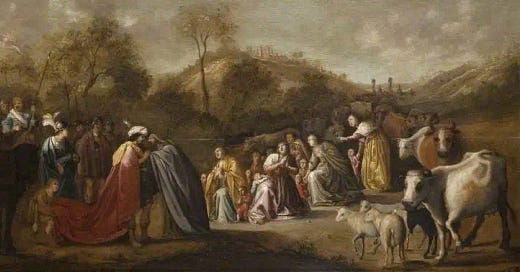There's Always Hope
Reflecting on the Seventh Sunday after Pentecost: One Day after Sunday (Year A)
Scripture (semicontinuous)
Psalter: Psalm 139:13-18
Old Testament: Genesis 32:3-21
Epistle: Revelation 14:12-20
Scripture (complementary)
Psalter: Psalm 75
Old Testament: Nahum 1:1-13
Epistle: Revelation 14:12-20
___
Prayer
To fulfill the ancient promise of salvation, O God, you made a covenant with our ancestors and pledged them descendants more numerous than th…
Keep reading with a 7-day free trial
Subscribe to Faith Seeking Understanding to keep reading this post and get 7 days of free access to the full post archives.




